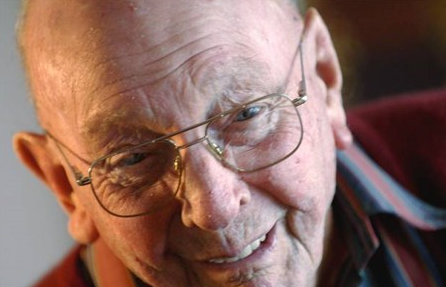近五十年来,里奇一直从自己悉尼的家眺望着太平洋,从这里可以欣赏到澳大利亚最如诗如画般的景致。然而,他会选择定居在这片梦幻而壮阔的地区,却并不是出于对大海的热爱。

Don Ritchie's window-watching had a far greater purpose. Since l964 he has saved at least 160 lives, though some say the true figure is much higher. Mr Ritchie, who died this week at the age of 86, was known as the Angel of the Gap, a title earned for persuading people not to throw themselves off the notorious Australian suicide spot.
唐·里奇隔窗眺望的不只是美景,而是一个更伟大的目标——生命。自1964年起,他已经拯救了超过160名自杀者——更有人说远远不止这个数字。多年来,他因为劝阻来到澳大利亚这个“自杀圣地”的人们而被亲切地称为“峡谷天使”。然而,人间天使未能永生,本周唐·里奇逝世,享年86岁。
Like Beachy Head on the Sussex coast, the sheer cliffs at the mouth of Sydney harbour have long acted as a magnet to those who have lost all hope. But thanks to his calm voice and sympathetic manner, Mr Ritchie offered a helping hand to the desperate by engaging them in conversation on the cliff-top in their hour of need.
正如萨塞克斯的比奇角一样,悉尼港河口的峭壁也是无数对生活完全丧失了信心的自杀者的首选。然而,幸好有里奇在。他用镇定的嗓音和温暖的方式和命悬一线的自杀者交谈,从而伸出救援之手。
A modest man who did not court celebrity or praise, Mr Ritchie would spot would-be suicides from his home and slowly walk across the road to them. At the cliff-edge he would simply smile and ask them, "Can I help you in some way?" More often than not the quiet approach worked, though on some occasions he risked his own life by physically restraining the more determined from making their final leap.
不为名利,不求褒奖,里奇始终从家里观察着悬崖,一旦发现意欲自杀的人,他就会稳步走过去微笑着问“有什么我能帮你的吗?”,这往往比什么都不说有用。虽然时不时还是有人打定主意要纵身一跃,但千钧一发之际他总是冒着生命危险去拉住自杀者。
Afterwards he would invite them back to his home for a cup of tea and a chat and occasionally they would return years later to thank him for saving their life. One survivor gave him a painting of an angel with the rays of the sun and the simple message: "An angel who walks amongst us."
把自杀者从悬崖上劝下来之后,里奇会请他们来家里坐坐,喝杯茶聊聊天。有时许多年过去,那些曾被他救过的人还会回来感谢他当年的劝阻。一位幸存者送给里奇一幅画,画上是一个闪耀着太阳光环的天使,旁边配着简单的一句:“我们身边的天使。”
"My ambition has always been to just get them away from the edge, to buy them time, to give them the opportunity to reflect and give them the chance to realise that things might look better the next morning," he once confided."You just can't sit there and watch them," he added. "You've got to try and save them."
“我只是想把要自杀的人从悬崖上劝下来,让他们有时间也有机会再好好想想,说不定就能想通一切都会好起来的。”里奇曾这样吐露心声。“我就是没办法坐视人们轻生,”他补充道,“总要有人去试着挽回他们的心意。”
Mr Ritchie's daughter, Sue, said her father enjoyed his ocean view, but was equally determined to watch out for troubled souls. He once said an offer of help "was all that was needed to turn people around and he would say not to underestimate the power of a kind word and a smile," she told the Sydney Morning Herald.
里奇的女儿苏曾说过父亲非常喜欢海景,但更笃定要帮助那些轻生的灵魂。“父亲曾说简单的一句话就能够使人回心转意,永远不要低估善意语言和温暖微笑的力量。”在接受悉尼先驱晨报采访时,她回忆道。
He was "a great mixture of strength and compassion... an everyday person who did an extraordinary thing for many people that saved their lives, without any want of recognition," she added.
“父亲富有勇气和同情心。他只是一个平凡的人,却拯救了这么多人的性命。这是件高尚的举动,而他却不求任何回报。”
Mr Ritchie was a seaman in the Royal Australian Navy during the Second World War and witnessed the Japanese surrender in Tokyo Bay in 1945. Back in Sydney he worked in the insurance industry. He would later tell friends of the people he had saved: "I was a salesman for most of my life and I sold them life."
里奇曾在二战期间效力于澳大利亚皇家海军,并于1945年在东京湾见证了日本投降。战争结束后,他回到悉尼从事保险推销工作。里奇曾这样跟幸存者的朋友说,“我做了大半辈子的保险推销员,而我卖给他们的是生命。”







